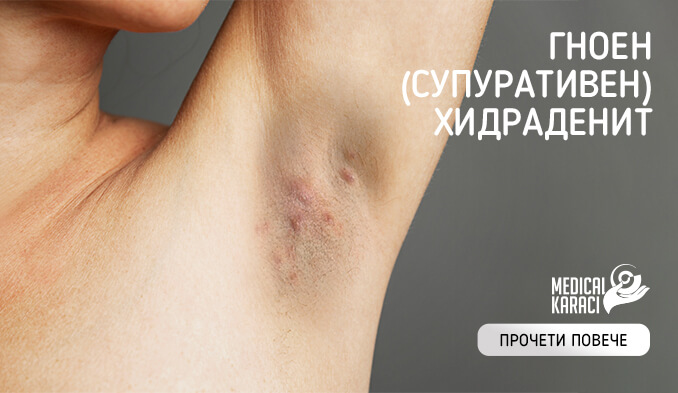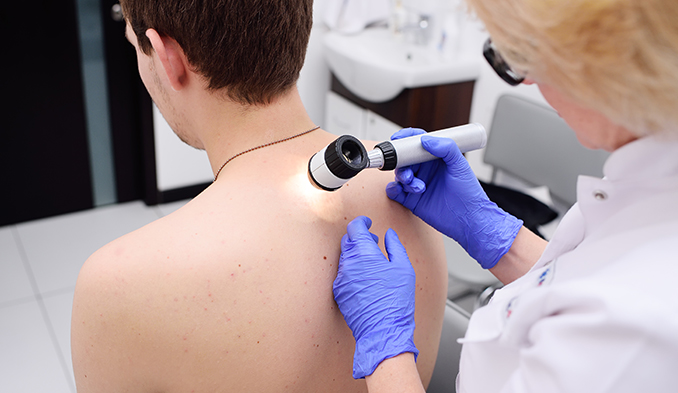Purulent hidradenitis is a condition that causes the formation of small, painful lumps under the skin. The lumps usually develop in areas where the skin rubs against skin, such as the armpits, groin, glutes, and chest. The lumps heal slowly, reappear and can form tunnels under the skin and scarring.
Purulent hydradenitis tends to start after puberty. It can last for many years and worsen over time, with serious consequences for the daily life and emotional well-being of sufferers. Combined medical and surgical therapy can help manage the disease and prevent complications.
Symptoms:
Purulent hydradenitis can affect one or several areas of the body.
Signs and symptoms of the condition include:
- Black dots. Blackheads appear on small areas of skin, often appearing in pairs.
- Painful lumps the size of a pea. The condition usually starts with a single, painful lump under the skin that lasts for weeks or months. Later, more bumps may form, usually in areas where there are more sweat and sebaceous glands or where the skin rubs against skin, such as the armpits, groin, glutes and chest.
- Leaking bumps or wounds. Some bumps or sores get larger, open up, and drain pus with a foul smell.
- Tunnels. Over time, tunnels can form under the skin connecting the lumps. These wounds heal very slowly, if at all, and drain blood and pus.
Some people with this condition experience only mild symptoms. The course of the disease is very variable. Being overweight and smoking are associated with worse symptomatology, but even people who are thin and do not smoke can get a complication of the disease.
When is a consultation with a doctor necessary?
Early diagnosis of purulent hidradenitis is the key to effective treatment. Consultation with a specialist is necessary if the condition :
- Is painful
- Obstructs traffic
- Does not improve after a few weeks
- Returns within weeks after treatment
- Appears in several places
- Ignites frequently
Reasons:
Purulent hydradenitis develops when the hair follicles become clogged. The exact cause is unknown. Experts believe it may be related to hormones, genetic predisposition, cigarette smoking or being overweight.
Purulent hydradenitis is not caused by infection and cannot spread to other people.
Risk factors:
Factors that increase the chances of developing purulent hydradenitis include:
- Age. The risk of purulent hidradenitis is higher in people 20-30 years old.
- Gender. Women are more likely to develop purulent hydradenitis than men.
- Race. Ethnicity or race can affect the level of risk.
- Family History. The tendency to develop purulent hydradenitis may be hereditary.
- Certain conditions. Purulent hidradenitis is more common and severe in overweight people. It also has an association with severe acne, arthritis, diabetes, metabolic syndrome, and inflammatory bowel disease.
- Smoking. Purulent hidradenitis and its complications are associated with smoking.
Complications:
Persistent and severe purulent hydradenitis can cause complications including:
- Infection. The affected area is susceptible to secondary infection, but the presence of pus is common in purulent hidradenitis and does not necessarily indicate infection.
- Scars and skin changes. Wounds may heal but leave scars.
- Restricted movement. Sores and scar tissue can cause restricted or painful movement, especially when the disease affects the armpits or buttocks.
- Skin cancer. Squamous cell carcinoma has been reported in long-term suppurative hidradenitis, especially in people whose condition involves the perianal area.
- Swelling of the arms, legs, or genitals. Most often the affected areas also contain many lymph nodes. The scars can interfere with the lymphatic drainage system, which can lead to swelling of the hands, feet, or genitals.
- Psychological effects and social isolation. The location, drainage and smell of the sores can cause embarrassment and reluctance in patients to go out in public, leading to anxiety or depression.
- Purulent hidradenitis is not just a boil and many people with this condition also have associated diseases. People with purulent hidradenitis are referred to a healthcare team with medical and surgical dermatologists at the core. Other specialists are also involved when necessary.
ZIC Medical Karaj can help you face the challenges of this disease. Contact us for more information!
For more information, we at Medical Karaj are at your service.
Call us on the following numbers "Medical Karaj": 0879 977 401 or 0879 977 402.
Also keep an eye on our constantly updated Facebook content.









